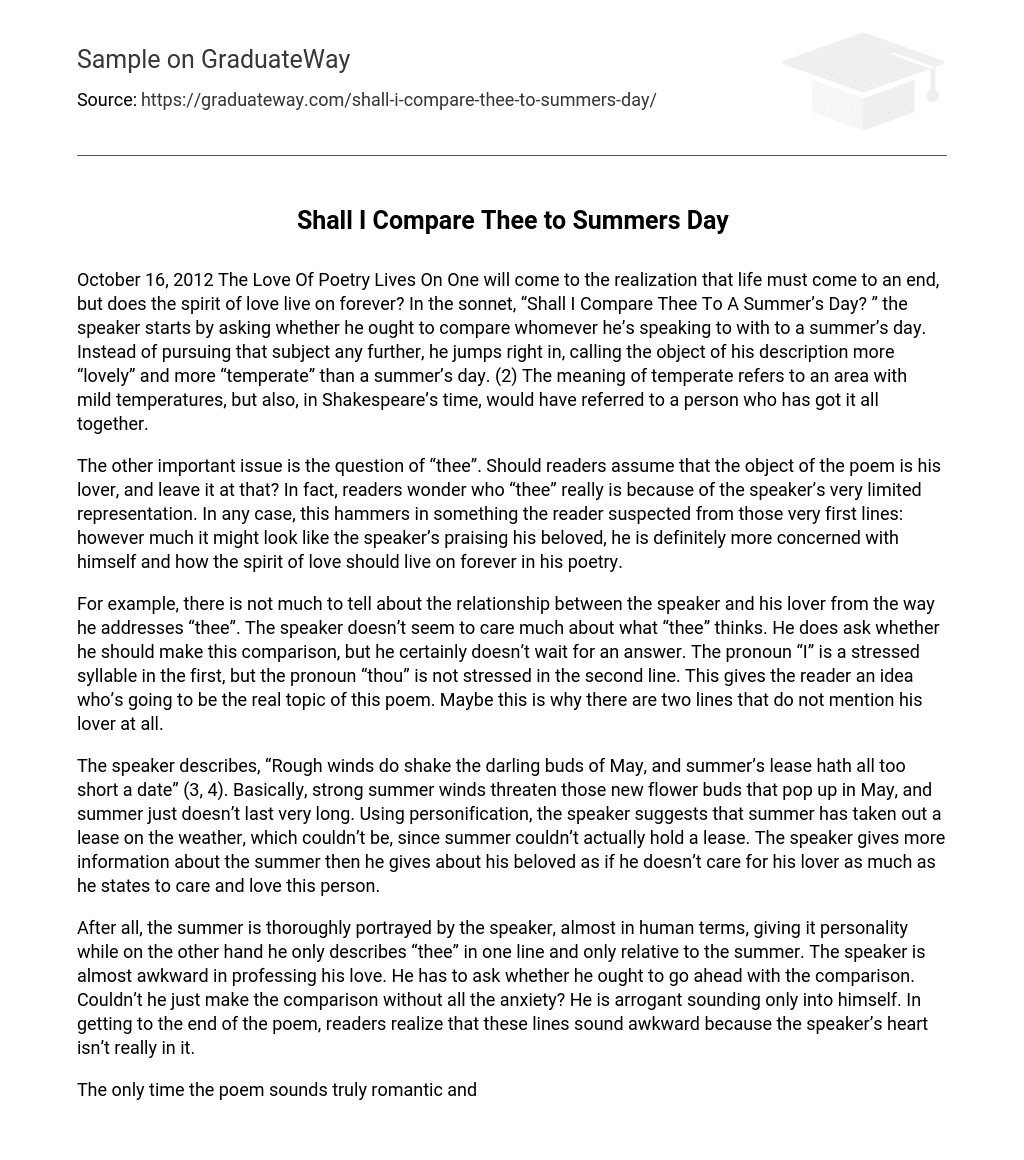October 16, 2012 The Love Of Poetry Lives On One will come to the realization that life must come to an end, but does the spirit of love live on forever? In the sonnet, “Shall I Compare Thee To A Summer’s Day? ” the speaker starts by asking whether he ought to compare whomever he’s speaking to with to a summer’s day. Instead of pursuing that subject any further, he jumps right in, calling the object of his description more “lovely” and more “temperate” than a summer’s day. (2) The meaning of temperate refers to an area with mild temperatures, but also, in Shakespeare’s time, would have referred to a person who has got it all together.
The other important issue is the question of “thee”. Should readers assume that the object of the poem is his lover, and leave it at that? In fact, readers wonder who “thee” really is because of the speaker’s very limited representation. In any case, this hammers in something the reader suspected from those very first lines: however much it might look like the speaker’s praising his beloved, he is definitely more concerned with himself and how the spirit of love should live on forever in his poetry.
For example, there is not much to tell about the relationship between the speaker and his lover from the way he addresses “thee”. The speaker doesn’t seem to care much about what “thee” thinks. He does ask whether he should make this comparison, but he certainly doesn’t wait for an answer. The pronoun “I” is a stressed syllable in the first, but the pronoun “thou” is not stressed in the second line. This gives the reader an idea who’s going to be the real topic of this poem. Maybe this is why there are two lines that do not mention his lover at all.
The speaker describes, “Rough winds do shake the darling buds of May, and summer’s lease hath all too short a date” (3, 4). Basically, strong summer winds threaten those new flower buds that pop up in May, and summer just doesn’t last very long. Using personification, the speaker suggests that summer has taken out a lease on the weather, which couldn’t be, since summer couldn’t actually hold a lease. The speaker gives more information about the summer then he gives about his beloved as if he doesn’t care for his lover as much as he states to care and love this person.
After all, the summer is thoroughly portrayed by the speaker, almost in human terms, giving it personality while on the other hand he only describes “thee” in one line and only relative to the summer. The speaker is almost awkward in professing his love. He has to ask whether he ought to go ahead with the comparison. Couldn’t he just make the comparison without all the anxiety? He is arrogant sounding only into himself. In getting to the end of the poem, readers realize that these lines sound awkward because the speaker’s heart isn’t really in it.
The only time the poem sounds truly romantic and heartfelt is towards the end when he’s talking about himself. In contrary, the speaker argues, “But thy eternal summer shall not fade, nor lose possession of that fair thou ow’st” (9, 10). He argues that unlike the real summer, his beloved’s summer will never go away, nor will the beloved lose their beauty. The speaker is claiming that the real summer is temporary, while the beloved’s summer is eternal. The speaker used personification in describing the beloved in the terms of nature, which could not literally apply.
In another bit of personification, the speaker introduces death. “Nor shall death,” the speaker claims, “brag thou wander’st in his shade, when in eternal lines to the time thou grow’st” (11, 12). Here, the speaker declares that first his poem is “eternal”, and second, that it nourishes “thee”. In other words, the speaker admits that as long as men live and can read, this poem will continue to live, and in doing so keep “thee” alive. Is it “thee” who will be alive, or rather the speaker’s very limited representation of “thee”?
The last two lines imply that this is a poem about living, not loving, especially after repeating “lives” and “life” in the final line. Love is never mentioned, except for implied self-love on the part of the speaker. At any rate, the speaker assumes that as long as people are reading, they’ll be reading his poem. The speaker is arrogant in his assumption that this poem will stay alive, and in turn, so will the object of his poem, the beloved. What kind of “life” does the speaker think the beloved will have?
He has predicted that this poem will continue to be read, and the beloved will continue to be analyzed. In other words, by allowing readers to try to give life to “thee” in figuring out who that lover was, the speaker and the poem itself, give “thee” life. By the end of the poem it is pretty clear poetry has become part of the world, as the speaker is much more into himself than the beloved he’s addressing. He really doesn’t even care how, or if anyone will answer his rhetorical question just as long as his poetry lives on.





